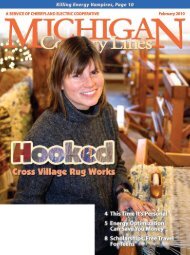Great - Michigan Country Lines Magazine
Great - Michigan Country Lines Magazine
Great - Michigan Country Lines Magazine
You also want an ePaper? Increase the reach of your titles
YUMPU automatically turns print PDFs into web optimized ePapers that Google loves.
Above: Jim Kirt and Morrumbala residents he employed to work in<br />
the sawmill he built in their African village. Top, right: Rachel Stivani,<br />
a Cherryland Electric Co-op member from Traverse City, MI, with<br />
Elijah, who works at the sawmill. Right: Jim Kirts’ sawmill helped<br />
jump-start the village’s economy, including expanded electric service<br />
that brought more rapid change, including a church and bank.<br />
a utility employee had removed a number of<br />
fuses to re-sell. After a lengthy discussion, the<br />
employee returned the fuses. Just this past<br />
Christmas, a transformer failure resulted in<br />
a week-long power outage that ran through<br />
the holidays.<br />
Electricity brought another exciting change<br />
to mill operations. The new electric table<br />
saws enabled expansion into the harvesting<br />
and processing of exotic African blackwood,<br />
a highly desirable wood prized by artisans<br />
and woodworkers worldwide.<br />
A relatively small, long-lived and slowgrowing<br />
tree, this blackwood has an esteemed<br />
place in history that dates to antiquity. Egyptians<br />
were so fond of it they sealed blackwood<br />
artifacts in their tombs. Ancients called it<br />
the “musical tree” because the dense, oily<br />
heartwood produces a beautiful sound when<br />
used for wind instruments. It’s a favorite for<br />
clarinets and bagpipes, and Luthiers treasure<br />
it for making stringed instruments, such as<br />
guitars. It’s also the wood of choice for custom<br />
billiard cues, knife handles, and fine turnings<br />
such as extremely thin finials and executive<br />
ink pens. In Africa, hand-carved blackwood<br />
figurines are a tourist favorite to this day.<br />
This brings our story full circle. In need of<br />
a distributor for their blackwood and other<br />
exotic woods harvested around Morrumbala,<br />
such as Panga Panga and African mahogany,<br />
the Kirts’ turned to their niece, Cherryland<br />
Electric Co-op member Rachel Stivani.<br />
Like her uncle, Rachel took a leap of faith.<br />
She knew little about wood and less about<br />
running a business, but given the niche<br />
market served and small order sizes, Rachel<br />
helped her aunt and uncle launch a webbased<br />
business named “Blackwood Source.”<br />
To keep overhead costs down, she keeps<br />
inventory in her garage and at a small storage<br />
shed south of Traverse City. Since launching<br />
the business, Rachel has filled orders from<br />
all but two states and shipped wood to every<br />
continent except Antarctica.<br />
Though web-based, Rachel has developed<br />
many personal relationships with customers<br />
who are eager to share stories and samples<br />
of their woodworking projects. Popular uses<br />
for the wood she supplies include game calls,<br />
bagpipes and executive ink pens.<br />
Given its natural beauty, it’s almost impossible<br />
not to become mesmerized by the<br />
blackwood species —especially when carefully<br />
worked by a master craftsman, and Rachel<br />
has not been immune from catching the<br />
bug. She recently completed an introductory<br />
wood-turning class and joined a local club.<br />
Back in Africa, strong worldwide demand<br />
coupled with agricultural expansion has<br />
raised concerns about the future sustainability<br />
of blackwood. Mill operators, like<br />
Kalibu Timbers, conservation groups, and<br />
governments across Africa are implementing<br />
practices that will allow the trees to flourish<br />
while maintaining an important source of<br />
revenue.<br />
As for Jim and Eileen Kirt, they are ready<br />
to start a new chapter in their lives and plan<br />
to relocate stateside early this year. Their<br />
departure will mean the end of Kalibu Timbers,<br />
but not the mission, as a new couple<br />
has stepped in to continue the good work<br />
started by the Kirts. Eventually, when existing<br />
inventories have run out, Blackwood Source<br />
will shut down, too.<br />
The Kirts’ do plan to return to Mozambique<br />
for short visits in the coming years and<br />
stay connected to the mission they began so<br />
many years ago. For them, it’s been a fascinating<br />
and rewarding journey that has touched<br />
many lives, which is what often happens<br />
when you choose a path less-travelled.<br />
Visit cherrylandelectric.com to see more<br />
pictures of the mission, sawmill, and people of<br />
Morrumbala.<br />
March 2013 | 11
















